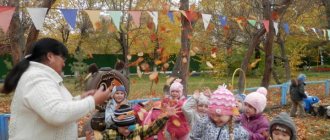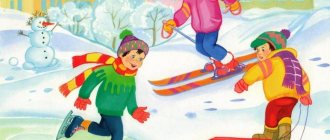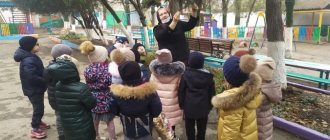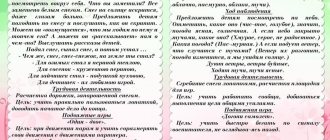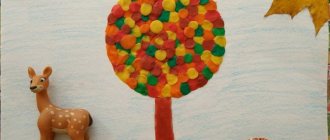Didactic games “Autumn” in the senior group
In the older group, games are needed to improve oral speech and the ability to define concepts, expand thematic knowledge, develop observation, perseverance, and the ability to perform collective and individual work. We must not forget about the physical development of preschoolers.
Make a proposal
The player receives a series of nouns, based on which he mentally composes and pronounces a thematic phrase. For example: umbrella, protection, rain - an umbrella protects from rain. Or: galoshes, rubber, shoes - galoshes are rubber shoes.
Take the golden leaf
This is an active game, the purpose of which is to teach the alternation of movements of different speeds and intensity. The game improves listening comprehension, develops the ability to work in a team, and improves the overall physical development of the preschooler.
The game is played on a warm autumn day in the courtyard of the kindergarten, when leaves of different colors are actively falling from the trees. The leader gives the command to move, to make any movements: run, walk, jump, wave your arms, dance. As soon as the presenter says “One, two, three! Take the golden leaf!”, the children stop, look at their feet, and pick up the leaf, painted exactly yellow. You cannot pick leaves from trees; you need to take only those that are on the ground. The first one to find a yellow piece of paper under his feet wins.
At the next stages of the game, the task can be changed, for example, “take a red leaf,” “take a maple leaf,” “take two leaves.”
Finish the sentence
Say the beginning of the topic sentence, and the children must complete it:
- in the fall I wear it outside - what? – coat, jacket, boots, shoes, hat, scarf;
- the foliage on the trees has become - what? – yellow, golden, red, sluggish;
- farmers harvest from fields and orchards - what? – harvest, fruits, vegetables;
- mushroom pickers collecting in the forest - what? – mushrooms, boletus, honey mushrooms, chanterelles, saffron milk caps, russula;
- I'll make a feeder for - who? – birds, tits, sparrows, squirrels;
- flying south - who? - birds, cranes, storks, swans, starlings, rooks, larks.
Didactic games on the theme “Autumn” in the preparatory group
In the preparatory group, preschoolers prepare to enter school, receive basic philological, mathematical and natural history knowledge, learn to analyze and construct sentences correctly.
Favorite autumn
Invite the students to tell how they feel about autumn, why they love it, and what they don’t like about this time of year. Answers should be detailed and begin with the following phrases:
- for me autumn is...;
- I like autumn because...;
- I don't like autumn because...
One or more
The game develops the skill of forming words in the plural. The presenter says a phrase, and the players change it. Here are examples:
- a rainy day has come - rainy days have come;
- a gray cloud hangs - gray clouds hang;
- light rain began to fall; light rain began to fall;
- a cold wind blew - cold winds blew;
- a leaf falls from a tree - leaves fall from trees;
- the day has become short - the days have become short;
- the bear lies down in a den - bears lie down in a den;
- the flock of cranes flew away - the flocks of cranes flew away.
Describe it beautifully
The presenter calls the word, and the players take turns listing suitable epithets:
- autumn – rainy, golden, clear, fine, cloudy, late, warm;
- the forest is motley, quiet, bare, sad, yellowed, dark;
- trees - yellow, golden, red, red, bare, multi-colored, bright, beautiful;
- foliage - fallen, yellowed, withered, wet, golden, brown, withered.
The game teaches you to select adjectives for nouns and develops your imagination.
Summary of an autumn walk in the preparatory group of a preschool educational institution
- April 6, 2016
Competition “Methodological piggy bank of a teacher - 2016”
Nomination “Methodological piggy bank of a preschool teacher”
Main stages of the walk:
1. Observations in nature.
2. Outdoor game.
3. Individual work (in subgroups).
4. Role-playing game.
5. Labor activity on the site.
Take-out materials: balls, crayons, equipment for playing with sand, brooms, rakes, garbage bags.
The progress of the autumn walk in the preparatory group of the preschool educational institution
1. Observations in nature.
Goal: to summarize and systematize children’s knowledge about autumn as a season; combine familiarization with seasonal changes in nature with the formation of aesthetic ideas; develop cognitive interest, thinking, memory, speech, attention.
– Guys, today we will take a walk around the territory of our kindergarten. Let us begin our journey with wonderful verses:
The rain is pouring, cold as ice, the leaves are spinning in the clearings, and the geese are flying in a long caravan over the forest.
– What time is spoken about in Ivan Bunin’s poem? (About autumn).
– What autumn months do you know? Name them. (Children's answers).
– What do people call September, October and November and why? (Children's answers).
– Let’s all remember the proverbs about autumn:
- Thunder in September - for a warm autumn.
- Late leaf fall means a harsh winter.
- There is no turn from autumn to summer.
- In September, even a leaf does not stick to the tree.
- There is no September without fruits.
- September is cold and full.
- October alternately cries and laughs.
- September smells like apples, October smells like cabbage.
- In November, winter and autumn are fought.
– Now let’s see if you can solve autumn riddles:
1) She came without paints and without a brush and repainted all the leaves..... (autumn. Draw the children’s attention to the foliage of the trees, note the color palette of autumn).
2) Leaves are falling from the aspen trees. A sharp wedge is rushing in the sky...... (a flock of cranes)
3) In the spring they grow, fall into the canopy………(leaves)
- Well done guys, you solved the riddles easily. And now I’ll tell you a little about folk signs. All of them were noticed by the people on the basis of constant observations of the life of nature:
- There are a lot of rowan trees - autumn will be rainy.
- The clouds are low - expect cold.
- If the leaves, falling off, lie with the wrong side up, it means a warm winter, with the front side up, it means a cold winter.
- Let's check what kind of winter we can expect. (Children consider the position of the leaves and draw conclusions. If opinions are divided, bring the children to the fact that the position of the leaves can change due to the wind).
- Guys, do you think we can check this sign? How? (Children's answers).
2. Outdoor game.
Goal: to develop dexterity, speed, coordination of movements, attention; develop the ability to play in a team, give in to each other; foster a sense of camaraderie; follow the rules of the game; develop speech and memory.
– In autumn it gets cool outside, so to keep us warm, we’ll play a game together. (We offer a choice of games “Mousetrap”, “Third Wheel”, “Trap”, “Find Yourself a Mate”).
3. Individual work (in subgroups).
Goal: overcoming shyness, developing observation, speech, mental abilities; practicing basic movements, developing moral qualities. One subgroup does math tasks (you can use crayons), the second subgroup plays “Dodgeball” with a ball or does exercises with balls individually or in pairs.
4. The role-playing game is chosen at the request of the children.
Goal: to create and maintain a calm, friendly environment during the game, to provide children with the opportunity to engage in activities that interest them; pay attention to withdrawn, shy children, help them find their place in the game; Involve overly excited children in activities that would help calm them down. (“Ice Cream Parlor”, “Fortress Builders”).
5. Labor activity on the site.
Goal: teach children to work with tools (rakes, brooms), teach them to work in a team, help each other; appreciate your work and the work of your comrades, learn to negotiate on controversial issues; be able to see and appreciate the results of your work; respect the work of the janitor.
- Guys, look how many leaves we have on our site. Let's put things in order here. (Give the children a tool, give a specific task. Summarize the work, praise the children for their diligence and hard work).
- And now for everyone who worked and was tired, lunch hour has come!
(Organized group care).
Author: Lyudmila Vladimirovna Kurchanova, teacher, MKDOU No. 13, Nizhneudinsk.
